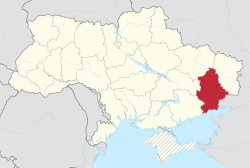|
Volnovakha bus attack
The Volnovakha bus attack was an attack on a highway checkpoint near the village of Buhas outside of the Volnovakha municipality in the Donetsk Oblast, Ukraine on 13 January 2015. It resulted in the deaths of 12 passengers of an intercity bus and injuries to 18 others in the area. The attack was the largest single loss of life since the signing of the Minsk Protocol in September 2014, which attempted to halt the War in Donbas. The incident has been labeled an "act of terror" by both the Ukrainian authorities[3] as well as the rebels.[4] Initially, separatists took responsibility for this incident, which they thought was a successful destruction of the Ukrainian roadblock. After the information about civilian bus hit the news, they denied having "even technical possibilities" to shell that area.[5] OSCE Special Monitoring Mission inspecting the place of incident assessed from its study of five craters that they were caused by "rockets fired from a north-north-eastern direction".[6] HRW investigation has concluded that "The attacked checkpoint is the northern-most government checkpoint before the front line with rebel forces. The tube-like shape of the craters clearly indicated that the rockets had come from the northeast."[7] The checkpoint named "Buhas" is located on the H20 highway at the intersection with another road accessing the city of Volnovakha. Beside Buhas and Volnovakha, there also is a village of Blyzhnie. AttackOn 13 January, a bus was carrying civilians moving northward to Donetsk from the village of Zlatoustivka (Zlatoustovka) and passing a small city of Volnovakha[10] on the Donetsk-Mariupol road (H20 highway). Approaching the zone controlled by the Donetsk People's Republic, the bus stopped at the checkpoint for passport control. Soon thereafter the checkpoint was fired upon, with multiple rockets landing next to the line of vehicles, including the bus. Shrapnel from a round tore through and completely disabled the bus, while killing and injuring several passengers. Ten people perished on site, while two more died soon after being brought to the hospital in Volnovakha.[2] The Ukrainian government's official version states that pro-Russian militants tried to shell positions near the Buhas checkpoint, which is 35 kilometres (22 mi) from the city of Donetsk. Donetsk Prosecutor's Office reported that militants fired more than 40 shells at the highway despite knowing the fact that it had been used only by civilians.[11] An official of the Donetsk Oblast Interior Ministry said, "It was a direct hit on an intercity bus".[12] According to the head of the main command center of the Armed Forces of Ukraine, Bohdan Bondar, the attack was launched from the center of Dokuchaievsk (city surrounded by the Volnovakha Raion), which is less than 35 kilometres (22 mi) away, as a provocation. When the attack happened, "there were reporters of local and Russian TV channels… who came there to film how our troops would return fire on the center of the city". The Ukrainian military labelled the incident a "provocation." Despite this, Ukrainian forces did not return fire.[13] The Donetsk People's Republic denied any involvement and said that the attack might have been staged by Ukrainian Army. Andrei Purgin, a Donetsk Republic party politician, said that "We don't have the capability to shell this checkpoint either from the side of Telmanove or Yelenivka. The Ukrainian side has to figure out what has happened deep in its territory. It's very far from the contact line". Denis Pushilin, another DPR leader, said that nearest rebel artillery was 50 km away, too far to reach the attack site. At the same time, NewsFront published a video of some militant leader[clarification needed] boasting about a successful attack on Hranitne from Telmanove.[14] The attack on Hranitne resulted in death of a 2-year-old child.[15][16] An OSCE report confirmed that a Grad rocket from north-northeast[6] had struck the bus, and said that DPR forces, the Russian Armed Forces, and the Ukrainian Armed Forces would conduct a joint investigation into the incident.[17] Ukrainian president Petro Poroshenko blamed the attack on separatist insurgents, and declared a day of national mourning.[18] LegalOn 17 January 2017 Ukraine's Ministry of Foreign Affairs filed a suit with the International Court of Justice, accusing the Russian Federation of "acts of terrorism, discrimination, and unlawful aggression" against Ukraine. The attack on Volnovakha was cited by Ukraine as an example of Russia supporting illegal armed groups engaged in terrorist activities.[19] Reactions
See also
References
External links
|
||||||||||||||||||||||||||||

